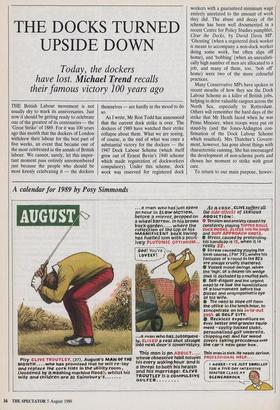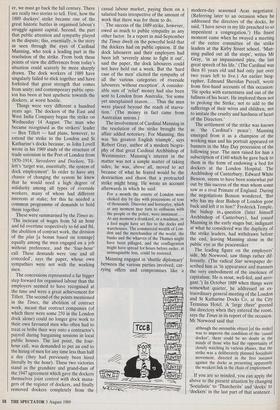THE DOCKS TURNED UPSIDE DOWN
Today, the dockers their famous victory 100 years ago
THE British Labour movement is not usually shy to mark its anniversaries. Just now it should be getting ready to celebrate one of the greatest of its centenaries — the 'Great Strike' of 1889. For it was 100 years ago this month that the dockers of London withdrew their labour for the best part of five weeks, an event that became one of the most celebrated in the annals of British labour. We cannot, surely, let this impor- tant moment pass entirely unremembered just because the people who should be most keenly celebrating it — the dockers
themselves — are hardly in the mood to do so.
As I write, Mr Ron Todd has announced that the current dock strike is over. The dockers of 1989 have watched their strike collapse about them. What we are seeing, of course, is the end of what was once a substantial victory for the dockers — the 1947 Dock Labour Scheme (which itself grew out of Ernest Bevin's 1940 scheme which made registration of dockworkers compulsory). Under this scheme, dock work was reserved for registered dock
workers with a guaranteed minimum wage entirely unrelated to the amount of work they did. The abuse and decay of the scheme has been well documented in a recent Centre for Policy Studies pamphlet, Clear the Decks, by David Davis MP. `Ghosting' (when a registered dock worker is meant to accompany a non-dock worker doing some work, but often slips off home), and 'bobbing' (when an unrealisti- cally high number of men are allocated to a job, and many of them, too, 'bob off' home) were two of the more colourful practices.
Many Conservative MPs have spoken in recent months of how they see the Dock Labour Scheme as a killer of British jobs, helping to drive valuable cargoes across the North Sea, especially to Rotterdam. Others will remember the hard days of the strike that Mr Heath faced when he was Prime Minister, when troops were put on stand-by (and the Jones-Aldington con- firmation of the Dock Labour Scheme which resulted). Mrs Thatcher's Govern- ment, however, has gone about things with characteristic cunning. She has encouraged the development of non-scheme ports and chosen her moment to strike with great care.
To return to our main purpose, howev- er, we must go back the full century. There are really two stories to tell. First, how the 1889 dockers' strike became one of the great historic battles in organised labour's struggle against capital. Second, the part that public attention and sympathy played in the dispute; this, essentially, is the story as seen through the eyes of Cardinal Manning, who took a leading part in the resolution of the strike. From both these points of view the differences from today's situation could scarcely be more sharply drawn. The dock workers of 1989 have singularly failed to stick together and have forfeited that great strength that comes from unity; and contemporary public opin- ion has been at best apathetic towards the dockers, at worst hostile.
Things were very different a hundred years ago. The dockers of the East and West India Company began the strike on Wednesday 14 August. The man who became recognised as the strikers' leader — Ben Tillett — had plans, however, to extend the strike to the London and St Katharine's docks because, as John Lovell wrote in his 1969 study of the structure of trade unionism in the Port of London from 1870-1914, Stevedores and Dockers, Til- lett's 'target was, essentially, the system of dock employment'. In order to have any chance of changing the system he knew that he would need a high degree of solidarity among all types of riverside workers, many of whom had different interests at stake; for this he needed a common programme of demands to hold them together.
These were summarised by the Times as: `The increase of wages from 5d an hour and 6d overtime respectively to 6d and 8d, the abolition of contract work, the division of the plus [a bonus based on tonnage] equally among the men engaged on a job without preference, and the 'four-hour' call. These demands were 'one and all conceded', says the paper, whose own sympathies were not with the working men.
The concessions represented a far bigger step forward for organised labour than the employers seemed to have recognised at the time and were a great achievement for Tillett. The second of the points mentioned in the Times, the abolition of contract work, meant that contract companies (of which there were some 250 in the London dock alone) could no longer give work to their own favoured men who often had to treat or bribe their way onto a contractor's payroll during bargaining sessions in local public houses. The last point, the four- hour call, was demanded to put an end to the hiring of men for any time less than half a day (they had previously been hired literally by the hour). These two victories stand as the grandsire and grand-dam of the 1947 agreement which gave the dockers themselves joint control with dock mana- gers of the register of dockers, and finally removed dockers completely from the casual labour market, paying them on a salaried basis irrespective of the amount of work that there was for them to do.
The success of the 1889 strike, however, owed as much to public sympathy as any other factor. In a report in mid-September the Times dwelt on the powerful hold that the dockers had on public opinion. If the dock labourers and their employers had been left 'severely alone to fight it out', said the paper, the dock labourers could not have held out a week. But the 'hard case of the men' elicited the sympathy of all the various categories of riverside labourers 'without exception'. A consider- able sum of `relief money had also been sent to London from Australia, 'for some yet unexplained reason.... Thus the men were placed beyond the reach of starva- tion.' (The money in fact came from Australian unions.) The involvement of Cardinal Manning in the resolution of the strike brought the affair added notoriety. For Manning, this was 'his greatest English triumph', says Robert Gray, author of a modern biogra- phy of that great Cardinal Archbishop of Westminster. Manning's interest in the matter was not a simple matter of taking sides; he was, above all, moved to act because of what he feared would be the destruction and chaos that a protracted strike might bring. He wrote an account afterwards in which he said:
For a month the streets of London were choked day by day with processions of tens of thousands. Disorder and horseplay, which at any moment may turn to collisions with the people or the police, were imminent.... At any moment a drunkard, or a madman, or a fool might have set fire to the docks and warehouses. The commercial wealth of Lon- don and the merchandise of the world, the banks and the wharves of the Thames might have been pillaged, and the conflagration might have spread for hours before order, at unimaginable loss, could be restored.
Manning engaged in 'shuttle diplomacy' between the various parties involved, car- rying offers and compromises like a modern-day seasoned Acas negotiator. (Referring later to an occasion when he addressed the directors of the docks, he said, 'I have never in my life preached to so impenitent a congregation.') His finest moment came when he swayed a meeting of the entire committee of the strike leaders at the Kirby Street school. 'Man- ning pulled out all the stops', writes Mr Gray, 'in an impassioned plea, the last great speech of his life.' (The Cardinal was then 81 years old and had only just over two years left to live.) An earlier biog- rapher, Edmund Sheridan Purcell, wrote from first-hand accounts of this occasion: 'He spoke with earnestness and out of the fullness of his heart. He implored them not to prolong the Strike, not to add to the sufferings of their wives and children, not to imitate the cruelty and hardness of heart of the Directors.'
The settlement of the strike was known as 'the Cardinal's peace'; Manning emerged from it as a champion of the working man and his portrait appeared on banners in the May Day procession of the following year. The men raised for him a subscription of £160 which he gave back to them in the form of endowing a bed for dockers at the London Hospital. The Archbishop of Canterbury, Edward White Benson, seems to have been somewhat put out by this success of the man whom some saw as a rival Primate of England. During the negotiations Benson wondered, 'But why has my dear Bishop of London gone back and left it to him?' Frederick Temple, the bishop in . question (later himself Archbishop of Canterbury), had joined Manning in the early stages but, indignant at what he considered was the duplicity of the strike leaders, had withdrawn before the end, leaving Manning alone in the public eye as the peacemaker.
The leading figure on the employers' side, Mr Norwood, saw things rather dif- ferently. (The radical Star newspaper de- scribed him as 'in appearance and manners the very embodiment of the insolence of capitalism. He is stout, well-fed, and arro- gant.') In October 1889 when things were somewhat quieter, he addressed an ex- traordinary general meeting of the London and St Katharine Docks Co, at the City Terminus Hotel. A 'large cheer' greeted the directors when they entered the room, says the Times in its report of the occasion. Mr Norwood said that
although the ostensible object [of the strike] was to improve the condition of the 'casual docker', there could be no doubt in the minds of those who had the opportunity of closely watching its various phases, that the strike was a deliberately planned Socialistic movement, directed in the first instance against the docks as presenting apparently the weakest link in the chain of employment.
If you are so minded, you can apply the above to the present situation by changing `Socialistic' to `Thatcherite' and 'docks' to 'dockers' in the last part of that sentence.



















































 Previous page
Previous page